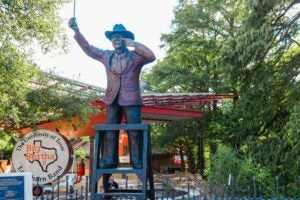The Alcalde
Dr. Don Carleton is executive director of the Dolph Briscoe Center for American History. He is the author of Being Rapoport: Capitalist with a Conscience; Dolph Briscoe: My Life in Texas Ranching and Politics; Red Scare; and three other books. He also holds the university’s J. R. Parten Chair in the Archives of American History.
My personal relationship with Walter Cronkite began in 1988 in my capacity as director of the university’s Center for American History (now the Dolph Briscoe Center for American History) when I decided to establish a news media history archive. I knew that Walter Cronkite’s papers could serve as the strong foundation for such a collection. Happily, Walter enthusiastically accepted my invitation to place his papers at the Briscoe Center. He was strongly attracted to the idea of an archive that would document the reporting and editorial processes that eventually result in the “news.” The Walter Cronkite Papers, measuring nearly 300 linear feet in size, has become the bedrock collection of the Briscoe Center’s News Media History Archive. Thanks not only to Walter’s generous gift of his papers, but also to his active involvement and support, the Center’s News Media History Archive is considered one of the most important archives on the history of television and newspaper journalism.
In 1989, Walter asked me to assist him in the research and preparation for his autobiography. We had become good friends, and he was aware of my work as an oral historian and specialist in 20th century U.S. history. Also, because of my knowledge of and access to his papers, he knew that I was well positioned to do the essential research. Every three to four months, for a period stretching over four years, Walter and I met for two or three days, sometimes longer, for me to interview him and to record the recollections of his extraordinary life and career. Those interviews were conducted in his office at CBS, his home in Manhattan, his summer residence in Martha’s Vineyard, and in the British Virgin Islands on his sailboat, the Wyntjie. Betsy Cronkite, his essential partner in everything that he did, provided moral support for the project as well as a great deal of wry humor to lighten our work load. Eventually, we produced more than 60 hours of recordings and hundreds of pages of transcript, which Walter used to write his autobiography, A Reporter’s Life. His dear friends Joe and Shirley Wershba, who have their own distinguished place in the history of news broadcasting and whose papers also are at the Briscoe Center, also provided research and editorial aid. Published by Alfred Knopf in 1996, A Reporter’s Life shot immediately to the top of The New York Times non-fiction bestseller list. It remains in print 13 years later. The interviews that Walter and I conducted were equally important in support of the eight-part television series Cronkite Remembers, which was broadcast on The Discovery Channel in 1996. I was pleased to serve as a historical adviser to the series.
When Walter died on July 17 at the age of 92, America marked the passing of a journalistic giant and a pop culture archetype. And the university marked the passing of one who was arguably its most famous son. Though he did not finish his degree, Walter remained proud of his alma mater throughout his historic career and returned to UT many times. Even students on campus today, most of whom were not even alive before his retirement in 1981, are connected to his voice via the “We’re Texas” public service announcements that play during football games. His storied career really started in this place.
Read an interview with Cronkite in Carleton’s forthcoming book “Conversations with Cronkite,” to be published in August 2010 by the Dolph Briscoe Center and distributed by the University of Texas Press.



